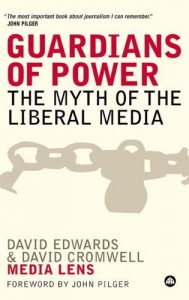Apologies if it’s been a while since I’ve written anything on here, I recently started studying an introductory Social Sciences course at the Open University, which has probably been taking most up the free time I would normally have used to write articles for this website, but I’m back for now…
Guardians Of Power – David Edwards & David Cromwell
 Before I review this book, I’d like to give a little background to medialens and what they do. Medialens is a ‘UK-based media watch project’ who publish informed criticism of media bias and censorship, revealing the distorted view of the world which mainstream media often provides. Run by the aforementioned Edwards and Cromwell, they publish weekly media alerts and base their work on Chomsky and Herman’s 1988 book ‘Manufacturing Consent – The Political Economy of the Mass Media’. In addition medialens also encourage their readers to challenge individual journalists on their work, something which has gained them some enemies in the past. However they are also influenced by the Buddhist view that ‘while greed, hatred and ignorance distort reason; compassion empowers it’, which hopefully provides us with the means to create a peaceful society, along with a fair and balanced media.
Before I review this book, I’d like to give a little background to medialens and what they do. Medialens is a ‘UK-based media watch project’ who publish informed criticism of media bias and censorship, revealing the distorted view of the world which mainstream media often provides. Run by the aforementioned Edwards and Cromwell, they publish weekly media alerts and base their work on Chomsky and Herman’s 1988 book ‘Manufacturing Consent – The Political Economy of the Mass Media’. In addition medialens also encourage their readers to challenge individual journalists on their work, something which has gained them some enemies in the past. However they are also influenced by the Buddhist view that ‘while greed, hatred and ignorance distort reason; compassion empowers it’, which hopefully provides us with the means to create a peaceful society, along with a fair and balanced media.
This, their first book, represents a compilation of their media alerts on a wide range of subjects.They start by giving some background on Chomsky and Herman’s ‘Propaganda Model’ of the media, on which the project is based, along with some examples of how ownership and advertising can play a huge role in what we actually read. Here’s wikipedia’s brief summary:
The propaganda model is a theory advanced by Edward S. Herman and Noam Chomsky that alleges systemic biases in the mass media and seeks to explain them in terms of structural economic causes.
It views the private media as businesses interested in the sale of a product — readers and audiences — to other businesses (advertisers) rather than that of quality news to the people. The theory postulates five general classes of “filters” that determine the type of news that is presented in news media. These five classes are: ownership of the medium, the medium’s funding sources, sourcing, flak and ‘Anti-communist ideology’. The first three are generally regarded by the authors as being the most important.
The authors make it quite clear that advertisers and owners are able to exert a high-level of control over their publications. In addition the pressure to retain advertisers, which medialens quote as providing 75% of their revenue, can necessitate self-censorship along with helping to decide which stories get coverage in the first place. For example, a newspaper may decide to omit any mention of carbon dioxide emissions from air travel if today’s edition also features a large cut-price flights promotion. A frightening thought indeed, but one which does occur frequently, largely unnoticed.
In coverage of news events, medialens ignore the right-wing and go straight for the UK ‘liberal’ media, beginning by exposing systematic failings in coverage of the Iraq war, along with the sanctions that preceded it. Their exchanges with former UN assistant secretary-general Denis Halliday and his criticism of the way in which sanctions were reported in the media were enlightening.
Their alerts covering the build up to the 2003 Iraq war again demonstrate how little a threat was posed by Saddam Hussein and his ‘weapons of mass destruction’, along with discussion of how certain (highly-qualified) voices were sidelined if their views didn’t quite match up with those of the establishment.
The book also features chapters on Afghanistan, Kosovo, climate change and the fight for independence in East Timor. All of which are truly excellent pieces of work. Towards the end the book makes a slight detour, concluding with suggestions for how the media can become more compassionate. The story of Helena Norberg-Hodge’s visit to the residents of Ladakh in Northern India really interested me, in that their way of life allowed them to be so happy and emotionally healthy whilst living in relative poverty, unaffected by the egotism and consumerism of the west.
I opened this book at 9am one day and quite honestly could not put it down until I’d finished it, it’s a fabulous wake up call to anyone who believes that we possess a honest and unbiased mainstream media. A second book was released this year called ‘Newspeak in the 21st Century’ and I can’t wait to get my hands on it.
I’d highly recommend that everyone visit the website and read some of their excellent work, subscribe to the weekly medialens alerts, and donate if you can.
One Comment
Hmm, I shall have to add that to my wishlist – still got a huge mountain of books to read before I can get round to this one though…